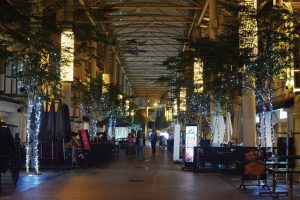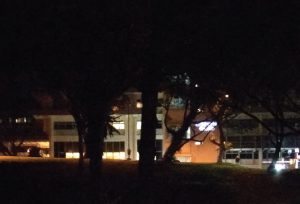Insufficient Outdoor Lighting

Example of a lighted outdoor arcade area

Example of an insufficiently lighted outdoor area
Design Guidelines
- Adhere to the guidelines and design criteria for lighting of work places (outdoors) as per SS 531-2:2008(2014). (See also CIE S 015/E:2005).
- Provide a hierarchy of lighting effects that correspond to the different zones and uses of the outdoor area [1].
- Ensure that lighting design will improve the energy and sustainability objectives of the building.
Construction Guidelines
- Building facade lighting fixtures must adhere to a total façade lighting power <5% of total interior lighting power (SS 530:2014). (See also ANSI/ASHRAE/IES Standard 90.1:2013).
- Ensure that display and ornamental lighting are separately controlled.
Maintenance Guidelines
- Comply with the minimum outdoor lighting requirements (SS 531-2:2008(2014). (See also CIE S 015/E:2005):
• pedestrian walkways 5 lux
• Slow moving traffic areas (<10km/h) 10 lux
• Regular vehicular traffic (<40km/h) 20 lux
• Pedestrian passages, loading/unloading points 30 lux
• Reading labels 50 lux
References
[1] Harris, C.W. and Dines, N.T. (1998). Time Saver Standards for Landscape Architecture: Design and Construction Data (2nd ed.). USA: McGraw-Hill.
Normative References/Standards Referred to for Outdoor Lighting
• ANSI/ASHRAE/IES Standard 90.1:2013 — Energy standard for buildings except low-rise residential buildings
• CIE S 015/E:2005 — Lighting of Outdoor Workplaces
• SS 530:2014 — Code of practice for energy efficiency standard for building services and equipment
• SS 531-2:2008(2014) — Code of practice for lighting of work places — Outdoor